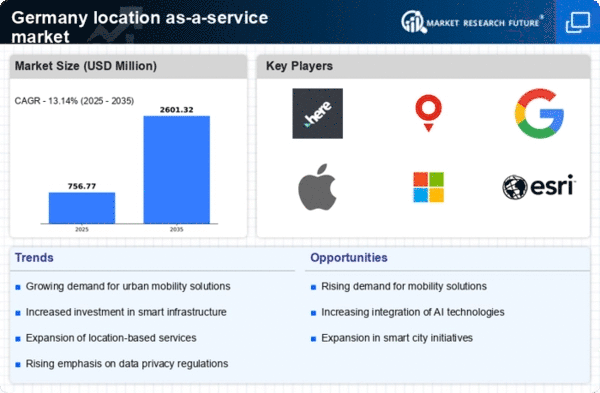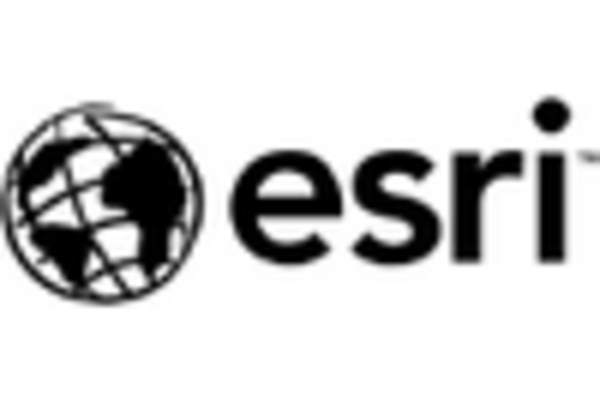Expansion of Mobile Applications
The proliferation of mobile applications in Germany is driving the location as-a-service market forward. With the rise of smartphones and mobile internet usage, businesses are increasingly integrating location-based services into their applications. This integration allows for personalized user experiences, such as location-based promotions and services. The mobile application market in Germany is expected to reach €10 billion by 2026, indicating a substantial opportunity for location as-a-service providers. As more companies develop mobile solutions that rely on location data, the demand for location services is likely to surge. Consequently, the location as-a-service market stands to gain from this trend, as businesses seek to enhance user engagement and satisfaction through innovative location-based functionalities.
Growing Demand for Real-Time Location Data
The increasing reliance on real-time location data is a pivotal driver for the location as-a-service market in Germany. Businesses across various sectors, including retail, logistics, and transportation, are leveraging location data to enhance operational efficiency and customer engagement. For instance, the retail sector utilizes location analytics to optimize store layouts and improve inventory management. According to recent studies, the demand for real-time location services is projected to grow at a CAGR of approximately 25% over the next five years. This trend indicates a robust market potential, as companies seek to harness location intelligence to gain competitive advantages. The location as-a-service market is thus positioned to benefit significantly from this growing demand, as organizations increasingly recognize the value of accurate and timely location insights.
Increased Focus on Supply Chain Optimization
The emphasis on supply chain optimization in Germany is a crucial driver for the location as-a-service market. Companies are increasingly recognizing the importance of location intelligence in managing their supply chains effectively. By utilizing location data, businesses can enhance logistics, reduce transportation costs, and improve delivery times. The logistics sector in Germany is projected to grow by 4% annually, highlighting the need for advanced location services. As organizations strive to streamline their operations and respond to market demands, the location as-a-service market is likely to experience heightened interest and investment. This focus on supply chain efficiency underscores the critical role that location data plays in modern business strategies.
Rising Consumer Expectations for Personalization
The rising consumer expectations for personalized experiences are shaping the location as-a-service market in Germany. As consumers become more accustomed to tailored services, businesses are compelled to leverage location data to meet these demands. This trend is particularly evident in sectors such as retail and hospitality, where personalized marketing strategies can significantly enhance customer satisfaction. Research indicates that 70% of consumers prefer personalized experiences, which drives companies to adopt location-based services. The location as-a-service market is thus positioned to thrive as businesses seek to implement innovative solutions that cater to individual preferences and enhance overall customer engagement.
Government Initiatives Supporting Smart Infrastructure
Government initiatives aimed at enhancing smart infrastructure in Germany are significantly influencing the location as-a-service market. The German government has been investing heavily in smart city projects, which often rely on location-based services for effective implementation. For example, initiatives to improve public transportation systems and urban planning utilize location data to optimize routes and reduce congestion. The investment in smart infrastructure is projected to exceed €100 billion by 2030, creating a favorable environment for the location as-a-service market. This influx of funding and support from governmental bodies is likely to accelerate the adoption of location services, as municipalities and private enterprises collaborate to create more efficient urban environments.
















